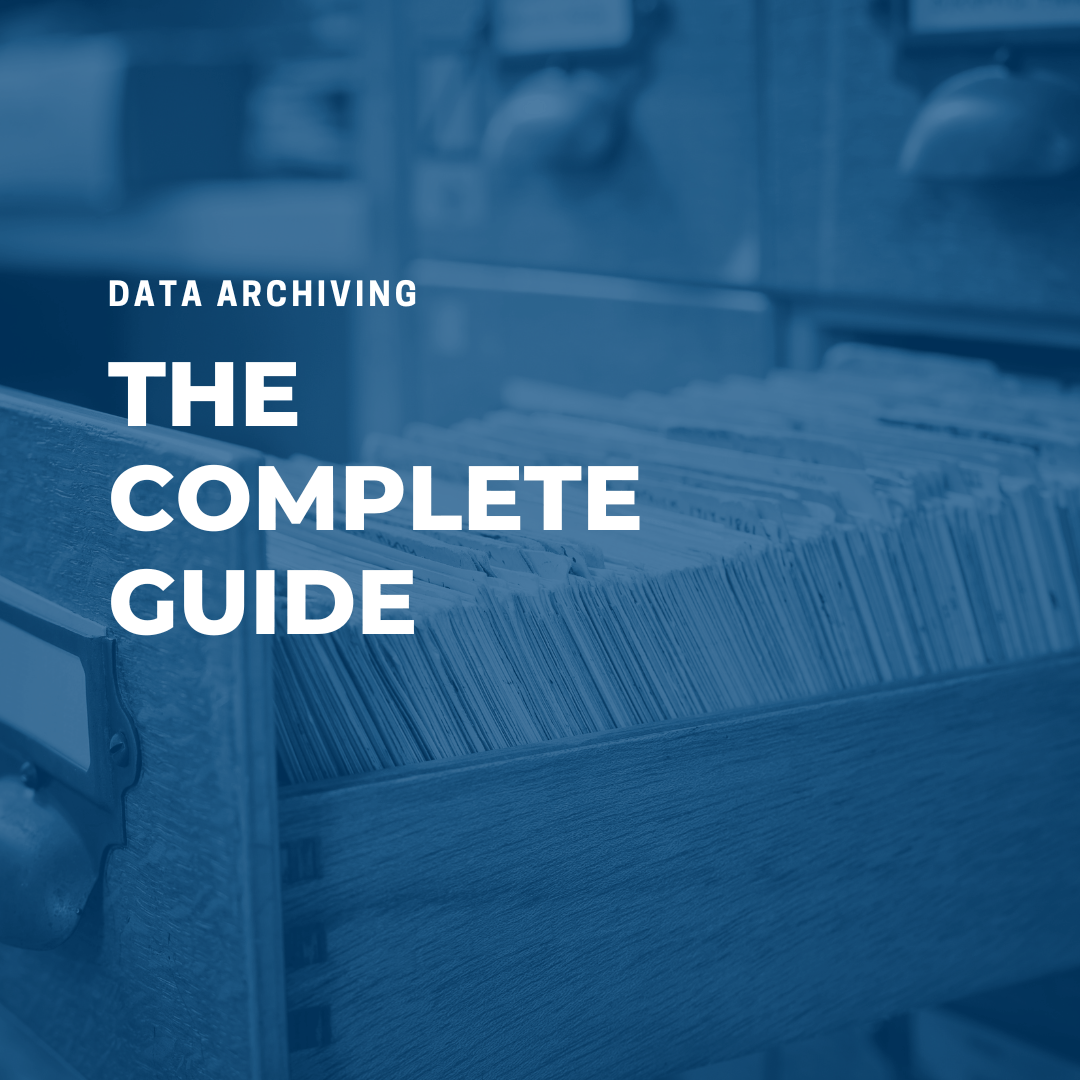Table of Contents
What does data archiving involve?
Data archiving involves archiving data securely, and is a critical business activity for organisations that need to retain historical data, but want to refine their storage resources.
In this complete guide, we highlight why having a data archiving strategy and creating a robust process for your organisation to follow is so important.
We discuss the benefits of data archiving, how it works, and other considerations we recommend thinking about when you decide to start archiving your data.
What is data archiving?
Data archiving is the act of taking data that is not needed on a regular/daily basis but is required to be kept for a longer period of time and moving it to a separate location.
Effective data archiving is a strategic necessity for businesses that want to manage their data efficiently, comply with legal requirements, and ensure data security.
The most common methods of archiving data include:
- Database – data can be copied from one database to another for ease of retrieval.
- Cloud – a scalable and cost-effective solution for storing any amount of data securely without any need for physical storage.
- Disk – this is a cost-effective solution for storing small amounts of data, and is preferred by organisations that prefer to keep their data on-premise. This is a modern alternative to tape-based storage, which is no longer commonly used.
Who should use data archiving?
Businesses of all sizes can make use of data archiving to maintain, manage, and protect their historical data.
Bespoke data archiving solutions can be developed to support different data types, storage locations, and volumes of data.
Some of the sectors that benefit from implementing a data archiving process include:
- Private sector
- Legal services
- Financial services
- Healthcare
- Government departments
- Education
Whoever looks after the databases, servers and applications at organisations in these sectors and beyond (e.g. database administrators, IT departments, and project managers) should consider developing a data archiving strategy if they don’t already have one.
Benefits of data archiving
1. Stay compliant with legal requirements
It’s crucial to ensure that your data archiving practices meet industry-specific regulations and legal requirements. This includes understanding retention periods and data protection laws, including GDPR.
In addition, it’s essential to maintain archived data in a manner that’s easily accessible for audits and legal inquiries.
2. Improved cost management
Businesses can reduce their spend on storage costs by moving infrequently accessed data to more cost-effective storage, such as cloud-based solutions.
Implementing a well-thought-out data archiving strategy can also help organisations to allocate IT resources more efficiently, by freeing up primary storage and reducing the load on active databases.
3. Safeguard data security and integrity
Support data security by protecting archived data with encryption to prevent unauthorised access. It’s also advisable to conduct regular integrity checks to ensure that archived data remains unaltered and intact over time.
4. Increase accessibility and usability
Ensure archived data can be retrieved easily when required by implementing robust indexing and search capabilities as part of your data archiving strategy. What’s more, businesses can define clear access controls to make sure only authorised individuals can access archived data.
5. Support disaster recovery and business continuity
It’s important to make sure that archived data is backed up and stored in multiple locations to protect against data loss.
Data backup is not the same as data archiving:
- Data archive – an archiving solution is for the purpose of retaining information in the long term and for various reasons is better not to be on the main host
- Data backup – your data backup is a copy of your data, stored separately, used for the sole purpose of mitigating risk against disaster but also accidental loss of data. Backed up data is critical for and to a company and should be protected, separately from the archive
Database administrators should also develop and test disaster recovery plans that include procedures for restoring archived data.
How to devise a data archiving strategy
Before you start archiving data, you need a strategy.
The important factors to consider are:
1. Identify what data needs to be archived
You need to decide what data/files need to be archived. For data stored in a database, it could just be a small number of tables rather than the entire database. For files, it could be just files of a certain type, categorised in a certain way.
2. Know when the data needs to be archived
Consider how long after creation each file needs to be archived; it could be immediately, or it could be after a number of years.
3. Determine how the data should be archived
Generally, data is archived in the same way it is stored; for example, if it’s currently stored in a database, it may remain in a database, just a different one on a different server.
If the data is file-based, it could be moved to a different file storage solution that could be on-prem or in a cloud-based solution.
4. Decide who needs to access the data
Consider who needs to access the archived data, as this may influence the necessary solution. It could be required by users for reporting on, or may just need to be kept for GDPR requirements.
Get started with data archiving
WellData has many years’ experience of building bespoke data archiving solutions that meet our clients’ specific needs.
We offer an end-to-end solution from initial consultation and strategy, through to implementation.
By considering the strategic aims of data archiving and the key considerations, and partnering with experts like WellData, business owners can develop robust data archiving practices that support their long-term data management goals.
Contact us today to find out more.


